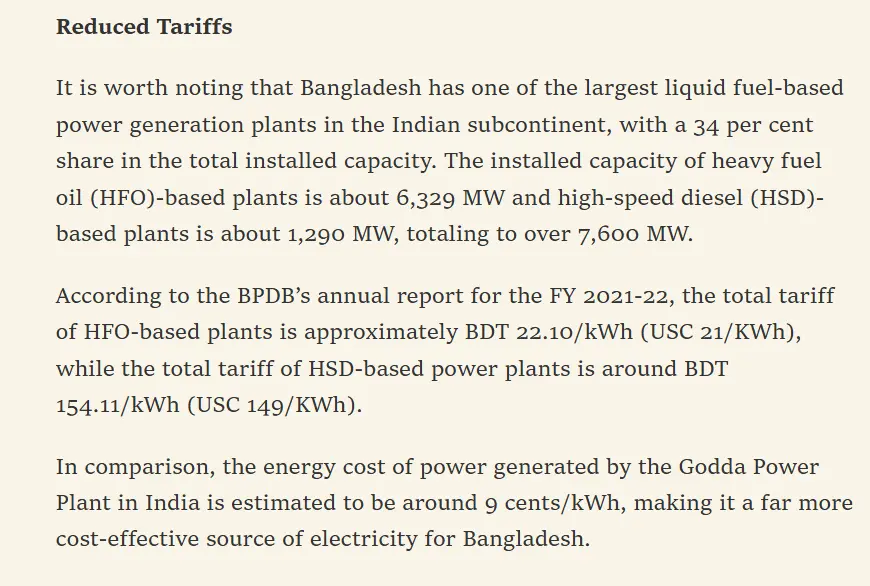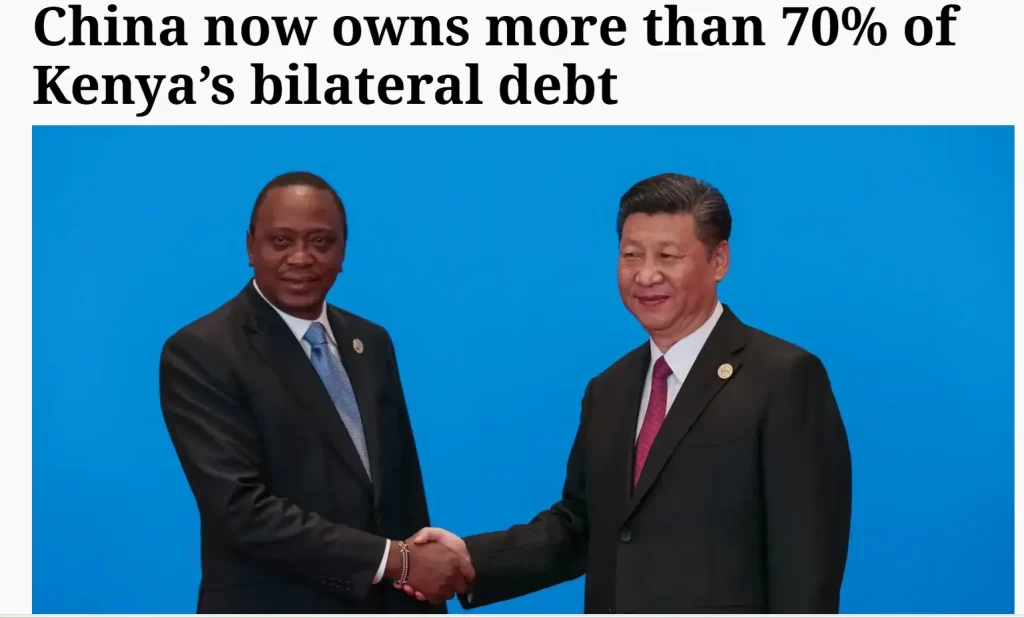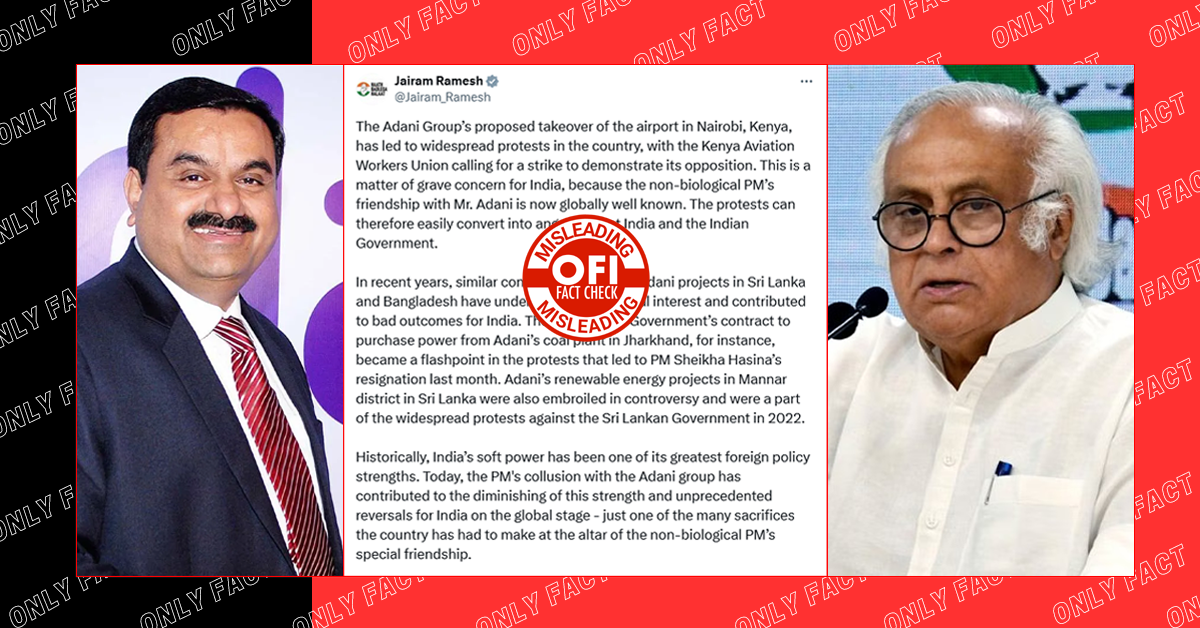Congress party’s communication head Jairam Ramesh has recently criticized one of India’s leading businessmen Gautam Adani for his proposed takeover of operations at Jomo Kenyatta International Airport (JKIA) in Nairobi, Kenya.
The Adani Group known for its extensive experience in managing airports, recently secured the bid to take over operations at Nairobi Airport. This should be seen as positive news highlighting an Indian businessman expanding his business into Africa. However, Jairam Ramesh in a recent post on X criticized the Adani Group for its business activities in Kenya. Ramesh insinuated that Adani’s business presence has previously destabilized governments in Sri Lanka and Bangladesh, hinting at the potential risks of engaging with the conglomerate.
Jairam Ramesh posted, ‘The Adani Group’s proposed takeover of the airport in Nairobi, Kenya, has led to widespread protests in the country, with the Kenya Aviation Workers Union calling for a strike to demonstrate its opposition. This is a matter of grave concern for India, because the non-biological PM’s friendship with Mr. Adani is now globally well known. The protests can therefore easily convert into anger against India and the Indian Government.
In recent years, similar controversies around Adani projects in Sri Lanka and Bangladesh have undermined our national interest and contributed to bad outcomes for India. The Bangladesh Government’s contract to purchase power from Adani’s coal plant in Jharkhand, for instance, became a flashpoint in the protests that led to PM Sheikha Hasina’s resignation last month. Adani’s renewable energy projects in Mannar district in Sri Lanka were also embroiled in controversy and were a part of the widespread protests against the Sri Lankan Government in 2022.
Historically, India’s soft power has been one of its greatest foreign policy strengths. Today, the PM’s collusion with the Adani group has contributed to the diminishing of this strength and unprecedented reversals for India on the global stage – just one of the many sacrifices the country has had to make at the altar of the non-biological PM’s special friendship.’
The Adani Group’s proposed takeover of the airport in Nairobi, Kenya, has led to widespread protests in the country, with the Kenya Aviation Workers Union calling for a strike to demonstrate its opposition. This is a matter of grave concern for India, because the non-biological…
— Jairam Ramesh (@Jairam_Ramesh) September 3, 2024
The Kenyan News media shared, ‘The proposed takeover of the JKIA by Indian firm Adani Group has taken a fresh twist following concerns raised by India’s Congress.’
The proposed takeover of the JKIA by Indian firm Adani Group has taken a fresh twist following concerns raised by India’s Congresshttps://t.co/LJKoFKm4Ol
— The Kenya Times (@thekenyatimes) September 4, 2024
Congress leader Jairam Ramesh issued three warnings to the Kenyan government, which we will address in our report:
1. The recent political unrest in Bangladesh is due to the involvement of the Adani Group in the country.
2. The 2022 protests in Sri Lanka, which destabilized the government, was because the Rajapaksa government business deal with the Adani Group.
3. The most serious warning is that if the government of Kenya continues to engage in business with the Adani Group, it could face the same fate as Bangladesh and Sri Lanka.
Fact Check
Is Sheikh Hasina’s government’s purchase of power from Adani’s coal plant the reason behind the destabilization of the Bangladesh government?
The real reason behind Sheikh Hasina’s fall and the political turmoil in Bangladesh is the alleged role of United States of America. This isn’t just a theory or fiction. To quote Sheikh Hasina herself: “I resigned so that I did not have to witness a procession of dead bodies. They wanted to seize power over the corpses of students, but I did not allow it—I resigned from the premiership. I could have stayed in power if I had surrendered the sovereignty of Saint Martin Island and allowed America to dominate the Bay of Bengal. I plead with the people of my land, ‘Please do not be manipulated by radicals.'” Before the quota movement, Hasina had warned in April that America was pursuing a strategy of regime change in her country. “They are trying to eliminate democracy and install a government without a democratic foundation,” she stated.

After the January 2024 election, Sheikh Hasina secured a victory, but her success was short-lived. Protests erupted in early July against the quota system that had been in place in Bangladesh for nearly five decades. What began as peaceful demands from university students to abolish quotas in civil service jobs—of which a one-third are reserved for relatives of veterans from Bangladesh’s 1971 independence war against Pakistan—soon escalated into a broader anti-government movement. Although their demands were largely met, the protests grew into a significant opposition against Hasina’s government, ultimately leading to her exile.
Now, let’s turn to the Adani Group’s role in Bangladesh. In July 2023, the Adani Group began supplying full-load power to Bangladesh from its 1,600 MW Ultra Super-Critical Thermal Power Plant (USCTPP) in Godda, Jharkhand. This marked the Adani Group’s entry into transnational power projects, with the Godda USCTPP being India’s first commissioned project where 100% of the generated power is supplied to another country.
It’s important to note that Bangladesh has one of the largest liquid fuel-based power generation sectors in the Indian subcontinent, with a 34% share of total installed capacity. The capacity of heavy fuel oil (HFO)-based plants is around 6,329 MW, and high-speed diesel (HSD)-based plants add about 1,290 MW, totaling over 7,600 MW. According to the BPDB’s annual report for FY 2021-22, the total tariff of HFO-based plants is approximately BDT 22.10/kWh (USC 21/kWh), while the tariff of HSD-based plants is around BDT 154.11/kWh (USC 149/kWh). In comparison, the energy cost of power generated by the Godda Power Plant in India is estimated at around 9 cents/kWh, making it a significantly more cost-effective source of electricity for Bangladesh.

The commencement of power supply from the Adani Group was a major boost for Bangladesh, a country of 170 million people facing its worst electricity crisis since 2013. Bangladesh has been forced to implement power cuts for 114 days in the first five months of 2023 due to an inability to import fuel, stemming from declining foreign exchange reserves and the 25% depreciation of the Bangladeshi taka against the U.S. dollar last year. To put this in perspective, at least 53 of the country’s 153 power plants were shut down in June for maintenance or due to a lack of fuel, according to data from the state-owned Power Grid Company of Bangladesh.
Despite the Adani Group providing cost-effective electricity to Bangladesh, both the company and Sheikh Hasina faced criticism over the deal. Now, even after the government’s destabilization and a new administration in place, the Adani Group has pledged to continue supplying electricity, despite being owed $800 million in unpaid dues.

To summarize the sequence of events in Bangladesh over the past two years:
1. In early 2022, the United States set its sights on Saint Martin Island.
2. In December 2022, protests erupted in Bangladesh over the high cost of living.
3. In July 2023, Dhaka finalized a deal with the Adani Group to supply power.
4. The U.S. intervened directly in Bangladeshi politics, a move that India objected to.
5. Sheikh Hasina won the January 2024 election.
6. In late June, student protests against the quota system began.
7. Sheikh Hasina resigned and went into exile in India.
The only conclusion that can be drawn is that due to geopolitical factors in the Indian subcontinent, the Adani Group, which provided cost-effective energy to Bangladesh and helped sustain its economy, is now left with significant unpaid dues following the fall of the Bangladeshi government. Thus, the implication made by Jairam Ramesh that Sheikh Hasina’s government was toppled because of a business deal with the Adani Group is inaccurate.
Did Adani’s Renewable Energy Projects in Mannar District, Sri Lanka, Lead to the Fall of the Government in 2022?
The accusation that Adani’s renewable energy projects in Mannar led to the fall of the Sri Lankan government in 2022 is baseless. Let’s take a closer look at what really happened in Sri Lanka in 2022.
The protests in Sri Lanka were driven by severe mismanagement of the economy, which resulted in a crippling economic crisis. This crisis involved extreme inflation, daily blackouts, and shortages of essential goods like fuel and cooking gas.
Sri Lanka’s economic troubles had been building for years, particularly due to the sharp rise in foreign debt since 2010. By 2019, this debt had ballooned to 42.6% of the country’s GDP. By February 2022, Sri Lanka had only $2.31 billion left in reserves, while needing to repay $4 billion in debt, including a $1 billion bond due in July.
Much of Sri Lanka’s debt came from International Sovereign Bonds (ISBs), which accounted for nearly half of the country’s external debt. Other major lenders included the Asian Development Bank, Japan, and China. The situation was worsened by global factors such as the economic impact of the COVID-19 pandemic and the spike in food and energy prices following Russia’s invasion of Ukraine in early 2022.
Domestically, government policy banning synthetic fertilizers led to a sharp decline in rice and tea production, two of Sri Lanka’s key exports. This policy alone caused economic losses of $425 million due to the drop in tea production and forced Sri Lanka to import rice at a cost of $450 million after seeing a 20% decline in rice production.
By 2021, Sri Lanka’s foreign debt had risen to 101% of its GDP. The government, under President Gotabaya Rajapaksa, made several policy errors, including significant tax cuts that reduced government revenue and increased the budget deficit. Instead of following the IMF’s advice to raise interest rates and taxes, the government chose to print money in large quantities, further exacerbating inflation and leading to the economic collapse.

The crisis reignited discussions about China’s role in Sri Lanka’s debt, especially regarding the controversial Hambantota Port, which was leased to China for 99 years. China was a significant creditor, and the roots of Sri Lanka’s economic crisis are attributed to the Chinese debt.

While there were minor protests here and there against the Adani Group’s Mannar deal, it’s important to recognize that the anger directed at Adani was likely fueled by China as a way to divert attention from the strong anti-China sentiment in Sri Lanka. In short, the true cause of the downfall of the Sri Lankan government in 2022 was years of economic mismanagement, compounded by global economic pressures and failed domestic policies. Therefore, any claims linking Adani’s projects to the government’s collapse are unfounded and serve as a clear example of misinformation.
If the Kenyan government continues its business dealings with the Adani Group, will the country face a fate similar to Bangladesh and Sri Lanka?
On September 2, workers at the Kenya Airports Authority (KAA) staged a protest at Jomo Kenyatta International Airport (JKIA), expressing concerns about job security and the impact of the Adani deal on local employment. The demonstration disrupted flights and was driven by fears that the public-private partnership (PPP) with Adani could prioritize foreign workers over Kenyan staff. This unrest stems from a two-month-long fake propaganda campaign that has fueled anxieties about job security.
Previously, we published a report that dispelled the criticism surrounding the allegedly shady business deal. The Kenyan government has also stated unequivocally that the deal with the Adani Group is the best option available. President William Ruto defended the PPP model, emphasizing the need to modernize JKIA. He criticized the current state of the airport’s infrastructure, stating: “Let’s be honest, Kenyans. The airport we have in Nairobi is made of canvas. It is a temporary structure we built almost seven years ago. Ethiopia has a brand-new airport, Rwanda the same, and this is why we need to work with investors to build a new airport in Nairobi.”

The Kenyan government only needs to address the concerns of the workers. Once these concerns are resolved, there will be little reason for further protest.
On the other hand, regarding the Adani Group’s operations at Nairobi Airport, the other competitor was a Chinese company. Furthermore, a report from December 2023 reveals that the Kenyan government will pay an additional Sh4.7 billion to two Chinese contractors as part of an out-of-court settlement for the cancellation of a tender to build the second terminal at JKIA eight years ago.

The report further states that the award, which brings the final payment to the contractors of the new Jomo Kenya International Airportterminal to Sh8.9 billion, is a significant reduction from the Sh17.6 billion initially demanded by the joint venture. Kenya had already paid Sh4.2 billion for the construction of the terminal, known as the Green Field Terminal, which was planned to be located within the grounds, between 0.75–1.5 km east of Terminal 1. An additional Sh75 million was spent on a groundbreaking ceremony presided over by retired President Uhuru Kenyatta on May 23, 2014. The terminal, which was to include a second runway and other facilities, was expected to cost Sh56 billion. However, the Kenya Airports Authority (KAA) canceled the tender in March 2016, citing material differences between the terms of the request for proposal (RFP) and the construction contract.
In essence, the government of Kenya has already been forced to pay Sh4.7 billion, plus an additional Sh500 million, to two Chinese contractors due to the cancellation of the airport terminal construction project over botched up material used by Chinese. The Chinese found legal loopholes, and unfortunately, Kenya had to pay a hefty sum for nothing.
Beyond this, China is notorious for its debt-trap diplomacy, particularly in Africa. Between 2006 and 2017, Kenya borrowed at least KSh. 1043.77 billion ($9.8 billion) from China. Chinese debt accounts for 21 percent of Kenya’s foreign debt and 72 percent of the country’s bilateral debt. China provided loans to Kenya for the construction of highways and a railway between Mombasa and Nairobi, totaling over US$6.5 billion by 2020. South Africa owes an estimated four percent of its annual GDP to China, including a controversial $2.5 billion loan from the China Development Bank. In October 2021, Uganda’s Parliament concluded that non-public loan terms from Exim Bank of China for a $200 million expansion of Entebbe International Airport were onerous and could potentially lead to the loss of the airport in case of default. China is also estimated to hold between one-fourth and one-third of Zambia’s external debt, comparable to other creditors such as the U.S. and the World Bank. Nigeria owes $3.1 billion of its total $27.6 billion foreign debt to China. Djibouti has borrowed heavily to develop a strategic port, with Chinese loans totaling 77 percent of its total debt. The country owes over 80 percent of its GDP to China. The Republic of the Congo owes an estimated $2.5 billion to Chinese lenders, although the exact figure is unknown, even by the Congolese government.

Conclusion: Senior Congress leader’s claim that Adani was involved in the destabilization of Sri Lanka and Bangladesh, and that protests against Adani in Kenya will lead to a similar outcome, is completely baseless. The overthrow of Bangladesh’s government was due to internal protests against Government Quota (Reservation) Law and foreign intervention, while Sri Lanka’s collapse resulted from economic mismanagement and substantial loans from China. The involvement of the Indian businessman lacks credibility in these scenarios.
Also Read: Analysis: Why the Hindenburg Accusations on Adani-SEBI Lack Substance?








